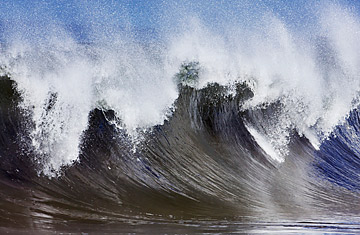
For centuries, the myth of the 100-foot wave was just that — a myth told by seafarers and sailors and doubted by those on land. In recent decades, scientists have been able to study and document such behemoth walls of water and the world's most adventurous surfers have begun to ride them. In her new book, The Wave: In Pursuit of the Rogues, Freaks, and Giants of the Ocean, Susan Casey — outdoors journalist and Editor-in-Chief of O, The Oprah Magazine — tells the thrilling tale of the (mostly) men who try to study and tackle these liquid giants. The ocean is nothing new to Casey, a champion swimmer and author of a previous book about great white sharks off the coast of Northern California. She spoke to TIME about the thrill of chasing waves all over the world, the mysteries of the ocean's depths, and the quickness with which the seas can knock you down to size.
When you say giant waves how big are you talking about here?
A ten-story building.
So there are ten-story building-sized waves out there in the ocean that, until recently, people didn't really believe existed. How destructive can these waves actually be?
Well, one of my favorite stats from the books is that an 18-inch wave can topple a wall built to withstand a 125 mph wind. Water is 800 times denser than air. So it's very destructive. I think the tsunami in 2004 really floored people who thought, "Oh my god, waves can do this?" That was annihilation. It's as if we forgot that this kind of damage can happen and we don't really think about it. Meanwhile sixty percent of the global population lives within 30 miles of a coastline and we still don't understand how these things really work.
Now one of the quotes you got from one scientist was mind boggling to me — "Two large ships disappear every week on average worldwide." How is that possible? Are there hundreds of people a year disappearing into the sea and we just don't hear about it?
Well, it's not that nobody hears about it. It's that it's not going to be on page one of the New York Times if a Lithuanian crew in a Liberian flagship goes down in the Andaman Sea. I went to the insurance firm Lloyds of London and their notion was "We don't know how many ships are going down, because between when they go down and when they're missing we don't know what happened to them." So I did a lot of work in the archives. The figure that I felt confident with is two a month. But that's still a lot.
Half of the book is about the science of big waves, but the other half is about the people who chase these waves — big wave surfers. How do they live their lives when they're devoted to chasing these things around the world?
That is their life. They're not stepping away from their lives to go chase these waves. Life is chasing these waves. If I were to characterize them I'd say they really remind me of the test pilots Tom Wolfe wrote about in The Right Stuff. They are to surfers what astronauts are to pilots. There's a rare type of person that wants to deposit themselves on the top of a hundred-foot wave.
You see little glimpses of this in the book, but are these guys — maybe spiritual isn't the right word — but would you say they have some connection to the greater energy around them? They all seem to be in touch with the ocean in some way.
There's nothing more helpless than looking at a 70-foot wave rearing up in front of you. They are never gonna conquer the wave and they know that. They have to respect nature and feel that force. I call it the most powerful force of nature outside of the sun. And the number of people who have stood on waves like that is not very many.
And would you say the surfers that are less humble, that are maybe more arrogant, are not necessarily the best ones?
The guys that I feature in the book are pretty humble. They're very superstitious and they believe in karma. And they believe in the Hawaiian principles of respecting the ocean. So they all have this superstition that if you walk around with a puffy chest, and you're all "I'm the man and I'm gonna rip it up," the ocean will teach you a lesson. They're all worried about that.
That seems weird because I associate surfing with some testosterone or some sort of aggression, especially if you're trying to tackle a huge wave.
Well think about it, if you're in space you would basically have a sense of there's something bigger out here, something very much bigger out here than me.
So great white sharks, giant waves. How'd you settle on the ocean as your big topic?
It's water. And it's always been water. I was born with this fixation on water, and I actually don't want to write about anything else. Plus, I think there are so many mysteries in the ocean, just fascinating primordial stories that I'd like to take people into it in maybe a way that they haven't been before.
Now that you've written two books about it, is it getting harder to write about the ocean? I figure there's only so many ways to describe the color of the sea.
That's true. I have to think of a lot of synonyms for the word blue.
